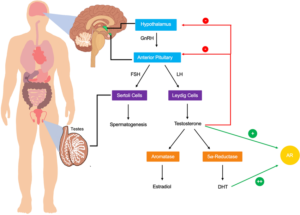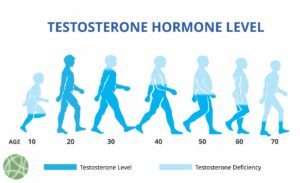- Your cart is empty
- Continue Shopping
Testosterone: A Comprehensive Guide to Understanding This Vital Hormone

Introduction
When people hear “testosterone,” they often think about masculinity, muscles, and aggression. But testosterone is much more than that! This powerful hormone plays a crucial role in both men’s and women’s health, affecting everything from physical development to emotional well-being.
So, what exactly is testosterone, and why is it so important? Let’s dive into the details.
The Role of Testosterone in the Human Body
Testosterone is a hormone primarily produced in the testicles for men and, to a lesser extent, in the ovaries for women. It’s responsible for developing male characteristics, but its functions go far beyond puberty.
Testosterone and Sexual Development

In males, testosterone kicks into high gear during puberty, promoting the development of secondary sexual characteristics like facial hair, a deeper voice, and increased muscle mass. It also plays a vital role in sperm production and sexual function. In females, testosterone contributes to libido and bone strength, even though it’s present at much lower levels.
Influence on Muscle Mass and Bone Density

One of testosterone’s primary functions is maintaining muscle mass and bone density. This is why men tend to have greater muscle bulk compared to women. Low testosterone can lead to reduced muscle strength and brittle bones, making people more prone to injury.
Testosterone’s Role in Mood and Cognitive Function
Ever felt more confident after a great workout? Testosterone is linked to positive mood regulation, cognitive sharpness, and even motivation. On the flip side, low testosterone levels can result in feelings of lethargy, depression, and irritability.
Natural Testosterone Production
Your body naturally produces testosterone, but the amount can vary significantly depending on your age, sex, and overall health.
How is Testosterone Produced?
In men, the testes produce the majority of testosterone, while the adrenal glands make a small amount. For women, testosterone is produced in the ovaries and adrenal glands. Production is controlled by signals from the brain, mainly the hypothalamus and pituitary gland.
Testosterone Levels Through Different Life Stages
Testosterone levels peak during adolescence and early adulthood and gradually decline as we age. This decline usually starts around the age of 30 and continues throughout life. The gradual reduction is natural, but a significant drop can lead to andropause, the male equivalent of menopause.
Differences Between Male and Female Testosterone Levels
Men naturally have much higher testosterone levels than women. However, testosterone is still critical in women’s health, affecting sexual function, muscle strength, and overall vitality.
Causes of Low Testosterone Levels
Low testosterone (often referred to as “Low T”) is more common than you might think. Several factors can contribute to a decline in testosterone levels.
Age-Related Decline (Andropause)
As mentioned earlier, testosterone levels decrease with age, a condition often termed andropause. It’s a normal part of aging but can have uncomfortable side effects like fatigue and reduced libido.
Health Conditions That Affect Testosterone Levels
Certain medical conditions, such as obesity, diabetes, and thyroid problems, can interfere with testosterone production. Autoimmune diseases and infections can also disrupt normal hormonal balances.
Lifestyle Factors That Lower Testosterone (Stress, Diet, Lack of Exercise)
Poor lifestyle choices can significantly affect testosterone levels. High stress, lack of physical activity, and an unhealthy diet (rich in processed foods and low in nutrients) can all contribute to lower testosterone.
Symptoms of Low Testosterone
How do you know if your testosterone levels are low? Here are some telltale signs.
Physical Symptoms
Low testosterone can lead to physical changes such as reduced muscle mass, weight gain (particularly around the belly), fatigue, and even hair loss. Bone density may also decrease, increasing the risk of fractures.
Emotional Symptoms
Emotionally, low testosterone can take a toll as well. It’s common for men with low testosterone to experience mood swings, depression, and irritability. A noticeable reduction in libido is often one of the first signs.
How to Diagnose Low Testosterone
If you suspect you have low testosterone, getting a proper diagnosis is essential.
Blood Tests and Hormone Panels
The most accurate way to measure testosterone levels is through blood tests. Your doctor will likely order a morning test, as testosterone levels tend to be highest early in the day.
Signs Your Doctor May Look For
Doctors often look for specific signs such as reduced muscle mass, lack of energy, and sexual dysfunction when diagnosing low testosterone. However, these symptoms can overlap with other conditions, making a blood test essential for confirmation.
Treatments for Low Testosterone
Once low testosterone is diagnosed, several treatment options are available.
Testosterone Replacement Therapy (TRT)
TRT is the most common treatment for low testosterone. It can be administered through gels, injections, or patches and works by supplementing the body’s natural testosterone production. However, TRT comes with risks and should only be considered under medical supervision.
Natural Supplements and Herbs
There are several natural supplements that claim to boost testosterone, including fenugreek, zinc, and ashwagandha. While some research supports these, it’s important to approach them with caution and consult your doctor.
Lifestyle Changes to Boost Testosterone Naturally
Simple lifestyle changes, such as regular exercise, a healthy diet rich in vitamins and minerals, and stress reduction, can also help elevate testosterone levels naturally.
Benefits of Healthy Testosterone Levels
Having healthy testosterone levels can bring several advantages, including:
- Improved Muscle Mass and Strength: A healthy level of testosterone supports muscle growth and recovery.
- Better Mental Health and Mood Regulation: Balanced testosterone levels contribute to a positive mood and reduce the likelihood of depression.
- Increased Energy and Libido: You’ll likely feel more energized and have a stronger sex drive when your testosterone levels are in check.
Risks of High Testosterone
Too much of a good thing can be harmful. Excessive testosterone can lead to negative side effects.
Side Effects of Excess Testosterone
High testosterone levels can cause side effects such as acne, oily skin, hair loss, and, in extreme cases, increased aggression.
Potential for Aggression, Acne, and Hair Loss
While testosterone doesn’t directly cause aggression, excessively high levels can influence irritability and aggression. Physical symptoms like acne and male pattern baldness can also occur.
Foods That Support Testosterone Production
Your diet plays a big role in your hormone levels. Some foods can boost testosterone production.
Nutrient-Rich Foods (Zinc, Magnesium, Vitamin D)
Zinc, magnesium, and vitamin D are vital for healthy testosterone levels. Foods like lean meats, eggs, nuts, seeds, and leafy greens are excellent sources of these nutrients.
Foods to Avoid (Processed Sugars, Soy Products)
On the flip side, avoid processed sugars, soy products, and excessive alcohol. These can negatively impact your hormone balance and reduce testosterone levels.
Exercise and Its Effect on Testosterone
Physical activity, especially strength training, can significantly impact testosterone production.
Weight Training and Strength Building
Lifting weights and engaging in resistance exercises are proven methods to boost testosterone. Compound movements like squats and deadlifts are particularly effective.
High-Intensity Interval Training (HIIT)
HIIT workouts are another excellent way to increase testosterone. The bursts of high-intensity activity help stimulate hormone production.
The Importance of Rest and Recovery
Over-exercising can have the opposite effect, lowering testosterone levels. Make sure to give your body plenty of rest and recovery time.
Testosterone Myths and Facts
There’s a lot of misinformation about testosterone. Let’s clear up a few common myths.
Does Testosterone Cause Aggression?
Testosterone doesn’t directly cause aggression, but imbalanced levels may influence mood changes and irritability.
Can Women Benefit from Higher Testosterone?
Yes! While women need much lower testosterone levels, boosting low testosterone can improve muscle tone, energy, and mood in women as well.
Testosterone in Women
Though often overlooked, testosterone is essential for women’s health too.
Role of Testosterone in Female Health
Testosterone helps regulate libido, bone density, and muscle mass in women. Low levels can lead to fatigue, weight gain, and reduced sexual desire.
Symptoms of Low Testosterone in Women
Women with low testosterone might experience hair thinning, decreased energy, and mood swings. Just like men, women need balanced testosterone for overall well-being.
When to See a Doctor About Testosterone Levels
If you’re experiencing symptoms of low testosterone, it may be time to talk to a healthcare professional.
Key Signs It’s Time to Get Tested
If you’re feeling chronically tired, losing muscle mass, or experiencing low libido, these could be signs that your testosterone levels are off balance.
What to Expect from Medical Consultations
Your doctor will likely start with a discussion of your symptoms and lifestyle, followed by blood tests to confirm your testosterone levels.
Conclusion
Maintaining balanced testosterone levels is crucial for both men and women. While testosterone naturally declines with age, there are many ways to manage and improve your levels through lifestyle changes, diet, and medical interventions if necessary.
Take care of your testosterone, and it will take care of you!
FAQs
- Can testosterone levels fluctuate daily?
- Yes, testosterone levels can fluctuate throughout the day, typically peaking in the morning and declining by evening.
- How can I naturally boost my testosterone levels?
- Regular exercise, a balanced diet rich in zinc and magnesium, and reducing stress are great natural ways to boost testosterone.
- Is testosterone therapy safe for everyone?
- Testosterone therapy isn’t suitable for everyone. It’s important to consult with a doctor to understand the potential risks and benefits.
- What happens if low testosterone is left untreated?
- Untreated low testosterone can lead to a range of issues, including decreased muscle mass, fatigue, mood disorders, and sexual dysfunction.
- Does testosterone play a role in weight loss?
- Yes, testosterone helps maintain muscle mass and regulate fat distribution, which can influence weight management.

